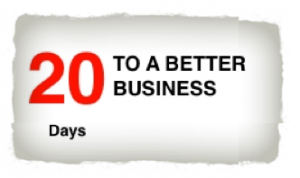This is Day 4 of the 20 Days To a Better Business series. In this series we look at tips and strategies to take your business to the next level. This week we are going to focus on why the time to start planning for taxes is now.
You can catch up here with the other posts in this 20 Days To a Better Business series .
This is Day 4: Start Tax Planning Now
As Mark Twain famously once said:
“The only two certainties in life are death and taxes.”
In the UK the end of the tax year is fast approaching (5th April), although for many businesses, they draw a close to their financial year at 31st March. In the US the fiscal year runs from 1st October to 30th September. Although individuals can opt for thier own tax year subject to IRS approval.
The point of all of this, is that these dates are fixed. Once the hammer is down on your year end, there is very little time to do anything about it.
Essentially tax is paid on the taxable profits of your business and not the accounting profits of your business. For a number of reasons taxable profits (the amount on which tax is due) may be higher or lower than the accounting profits. This is because accounting rules are designed to represent the business as a going concern (i.e. assuming that the business will continue to trade). Whereas the tax authorities base the tax charge on a point in time.
There are two very important considerations that you need to note around tax:
- the absolute amount that you pay
- the ability to pay it
Many businesses make the mistake of thinking that the amount of money that they having in their bank account is theirs to spend as they wish. Sadly, this is not the case and unless you can pay the tax on time you could face penalties, including fines and prison sentences and interest payments. In the UK tax is due for companies 9 months after the financial year in which it was earned. Which whilst it does give you a cash benefit of upto 9 months, it means that opportunities to minimise tax in the following financial year could be hindered.
Here are 5 things you could consider to minimise your tax position this year:
- Start planning for retirement
Paying into a retirement account is usually allowable against tax and so if you haven’t got any plans for retirement, then now may be the time to consider taking professional advice. - Know your tax law
Tax law generally changes each year, with new allowances, new rules and closing down practices deemed to be tax avoidance. Equally Tax Law is very complex and it may be worth taking specialist tax advice to come up with a plan for you. - Start saving
If you have been in business a little while then you may have an awareness of how much tax your paid last year, so putting the equivalent percentage of your income away into a savings account will help minimise cash flow worries when it comes to having to pay the cash over. If you have over provided, then so much the better. - Accelerate Big purchases
If you know that you’re going to need an item of equipment or materials in the first couple of months in the next financial year, then you could bring your purchase forward, even if it means that you have to use a credit card to do it. The other advantage of this is you might be able to negotiate better pricing from your suppliers by bringing the purchase forward or timing it near their year or quarter end. - Get an Accountant
Knowledge of Tax Law is a complex business and unless you’ve got time on your hands or you suffer from insomnia, it probably isn’t for you. Consequently having a good accountant can save you many times their fees in saved tax. Which comes from not only from knowledge of Tax Law but experience of other businesses in the same position as you. When you’re in the market for an accountant, first seek recommendations from other people in your line of business, but don’t just go on price. Secondly, make sure you meet with your accountant at least a month prior to your end of year.


